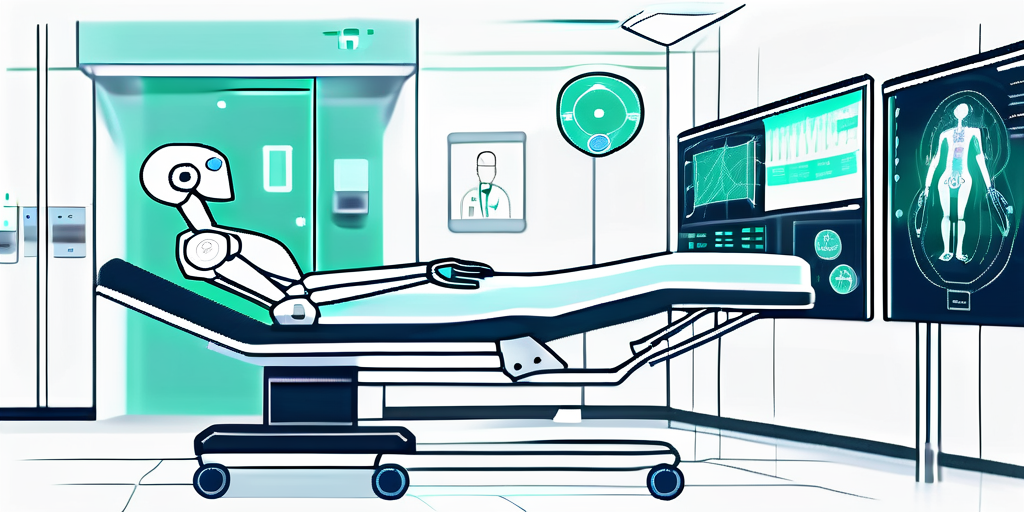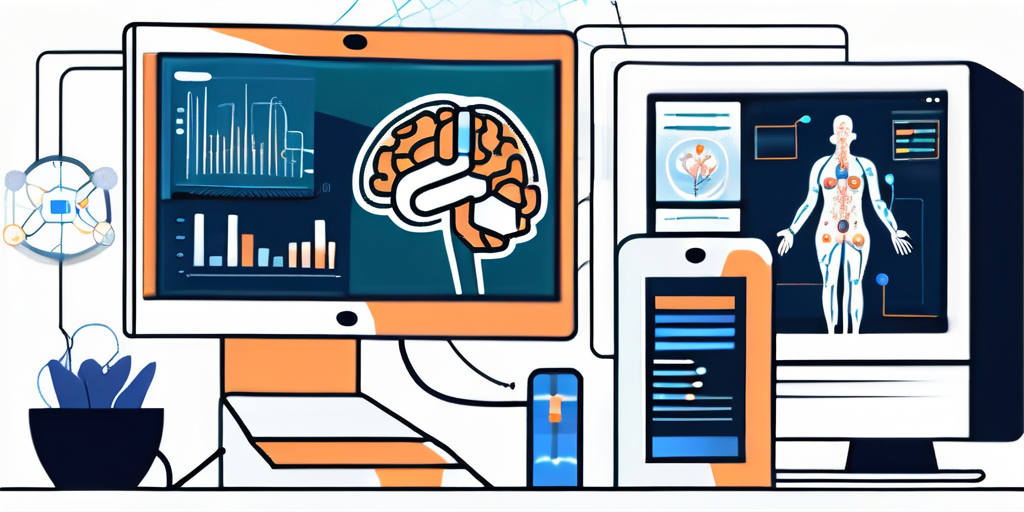In recent years, the healthcare industry has witnessed a significant shift towards data-driven decision making. With the advent of artificial intelligence (AI), healthcare management has become more efficient, accurate, and patient-centric. AI has emerged as a powerful tool in harnessing the vast amount of healthcare data available, enabling healthcare professionals to make informed decisions and improve patient outcomes.
Understanding the role of AI in healthcare management
Artificial intelligence has revolutionized various sectors, and healthcare is no exception. The rise of AI in healthcare has paved the way for remarkable advancements in medical diagnosis, treatment, and patient care. AI algorithms can analyze large datasets, detect patterns, and provide valuable insights to healthcare providers. This has led to improved accuracy in diagnosis and personalized treatment plans for patients.
Furthermore, the integration of AI in healthcare management has also enhanced the efficiency of administrative tasks, such as scheduling appointments, managing medical records, and handling billing processes. By automating these mundane tasks, healthcare professionals can focus more on delivering quality care to patients, ultimately improving overall healthcare services.
The rise of artificial intelligence in healthcare
The use of AI in healthcare has grown exponentially in recent years. According to a report by Frost & Sullivan, the AI in healthcare market is expected to reach a value of $6.7 billion by 2021. This growth is driven by the increasing need for efficient healthcare management, improved patient outcomes, and cost reduction.
Moreover, the adoption of AI technologies in healthcare is not limited to developed countries; developing nations are also recognising the potential benefits of AI in addressing healthcare challenges. Initiatives are being taken to implement AI-driven solutions in remote areas to improve access to quality healthcare services and bridge the gap between urban and rural healthcare facilities.
Key functions of AI in managing healthcare data
AI-powered systems can perform various functions in managing healthcare data. These include data collection, data analysis, predictive modeling, and decision support. By automating these processes, healthcare providers can streamline their operations, optimize resource allocation, and make data-driven decisions.
Additionally, AI plays a crucial role in enhancing patient engagement and adherence to treatment plans. Through AI-powered chatbots and virtual assistants, patients can receive real-time support, reminders for medication, and access to healthcare information round the clock. This level of continuous support and guidance contributes to better patient outcomes and overall satisfaction with the healthcare services provided.
The impact of data-driven change on healthcare systems
Data-driven change in healthcare management has the potential to revolutionize the entire healthcare system. The integration of AI and data analytics can bring about improved patient care, operational efficiency, and cost-effectiveness.
In addition to the significant advancements in patient care and operational efficiency, the integration of data-driven change in healthcare systems also presents a unique opportunity to enhance preventive care strategies. By leveraging AI and data analytics, healthcare providers can identify patterns and trends in patient data that may indicate potential health risks or diseases. This proactive approach allows for early intervention and personalised preventive care plans, ultimately leading to better health outcomes for patients.
Enhancing patient care through AI and data
By analyzing patient data, AI algorithms can provide healthcare professionals with valuable insights to improve patient care. For example, AI-powered systems can predict patient deterioration and alert healthcare providers in advance. This early warning system can help prevent adverse events and save lives.
Streamlining healthcare operations with AI technology
AI technology can streamline healthcare operations by automating manual tasks and optimizing resource allocation. For instance, AI-powered scheduling systems can efficiently allocate resources such as doctors, nurses, and healthcare equipment, minimizing waiting times and improving the overall patient experience.
Furthermore, the implementation of AI technology in healthcare systems can also lead to significant cost savings. By automating repetitive tasks and reducing inefficiencies, healthcare providers can allocate their resources more effectively, ultimately reducing operational costs. This cost-effectiveness not only benefits healthcare organisations but also has the potential to lower healthcare costs for patients, making quality healthcare more accessible and affordable.
Overcoming challenges in implementing AI in healthcare
Despite the numerous benefits AI offers in healthcare management, there are challenges that need to be addressed for successful implementation.
Integrating artificial intelligence (AI) into healthcare systems has the potential to revolutionise patient care, diagnosis, and treatment. By harnessing the power of machine learning and data analytics, healthcare providers can improve efficiency, accuracy, and outcomes for their patients. However, the adoption of AI in healthcare is not without its hurdles, and addressing these challenges is crucial for the effective implementation of AI technologies.
Addressing data privacy and security concerns
One of the major concerns surrounding AI in healthcare is data privacy and security. With the vast amount of sensitive patient data being collected and analyzed, it is essential to ensure robust data protection measures are in place. Healthcare organizations must comply with data privacy regulations to maintain patient trust and confidentiality.
Furthermore, the implementation of blockchain technology can enhance data security in AI applications within healthcare. Blockchain offers a decentralised and tamper-proof system for storing and sharing data, ensuring the integrity and confidentiality of patient information. By leveraging blockchain alongside AI, healthcare organisations can bolster their data security measures and mitigate the risks associated with cyber threats and data breaches.
Ensuring the accuracy and reliability of AI systems
AI systems must be rigorously tested and validated to ensure their accuracy and reliability in healthcare management. It is crucial to have well-defined protocols for training AI algorithms and continuously monitor and update them to reflect the most up-to-date medical knowledge. Additionally, transparency in AI algorithms is vital to gain the trust of healthcare professionals and patients.
Moreover, the implementation of explainable AI (XAI) can enhance the interpretability of AI systems in healthcare. XAI focuses on developing AI models that provide clear explanations for their decisions and predictions, enabling healthcare professionals to understand the reasoning behind AI recommendations. By incorporating XAI into healthcare AI applications, clinicians can have greater confidence in the technology and make more informed decisions based on AI-generated insights.
The future of AI in healthcare management
As AI continues to advance, the future of healthcare management looks promising. With ongoing research and development, AI technology is expected to bring about significant advancements in healthcare.
Predicted advancements in AI and data technology
In the future, AI is expected to play a more significant role in early disease detection, precision medicine, and personalized healthcare. AI algorithms can analyze genetic data, medical imaging, and patient records to identify potential risks and develop targeted treatment plans. This has the potential to revolutionize the field of healthcare and improve patient outcomes.
Preparing for a data-driven future in healthcare
As healthcare organizations embrace data-driven change and AI technology, it is important to build a strong foundation for data analytics. This involves investing in robust data infrastructure, training healthcare professionals in AI and data analysis, and fostering a culture of innovation and learning. Collaboration with researchers, data scientists, and technology experts is essential to stay at the forefront of advancements in healthcare management.
Furthermore, the integration of AI in healthcare management has the potential to enhance patient engagement and improve the overall patient experience. AI-powered chatbots can provide patients with instant access to medical information, answer their queries, and even schedule appointments. This not only saves time for healthcare professionals but also empowers patients to take control of their own healthcare journey.
Moreover, AI can also assist in clinical decision support, helping healthcare providers make more accurate diagnoses and treatment decisions. By analyzing vast amounts of medical literature and patient data, AI algorithms can provide evidence-based recommendations, reducing the risk of errors and improving patient safety.
In conclusion, the integration of AI and data-driven decision making has the potential to transform healthcare management. From improving patient care to streamlining healthcare operations, AI empowers healthcare providers to make data-driven decisions for better outcomes. However, addressing challenges such as data privacy and accuracy is crucial for successful implementation. As we look to the future, embracing a data-driven approach and harnessing the power of AI will be key in shaping the healthcare landscape and improving patient outcomes.
Ready to elevate your clinic’s healthcare management to the next level with AI? At Clinic Marketing AI, we understand the transformative power of artificial intelligence in enhancing patient care and streamlining operations. Angelo Rosati, our CEO, brings a wealth of experience from the health tech world to guide your clinic through this data-driven revolution. We’re not just a service provider; we’re your partner in growth, committed to delivering excellence in every aspect of our work. Book a Call with Us today, and let’s embark on this journey to transform the future of Your Clinic together.




